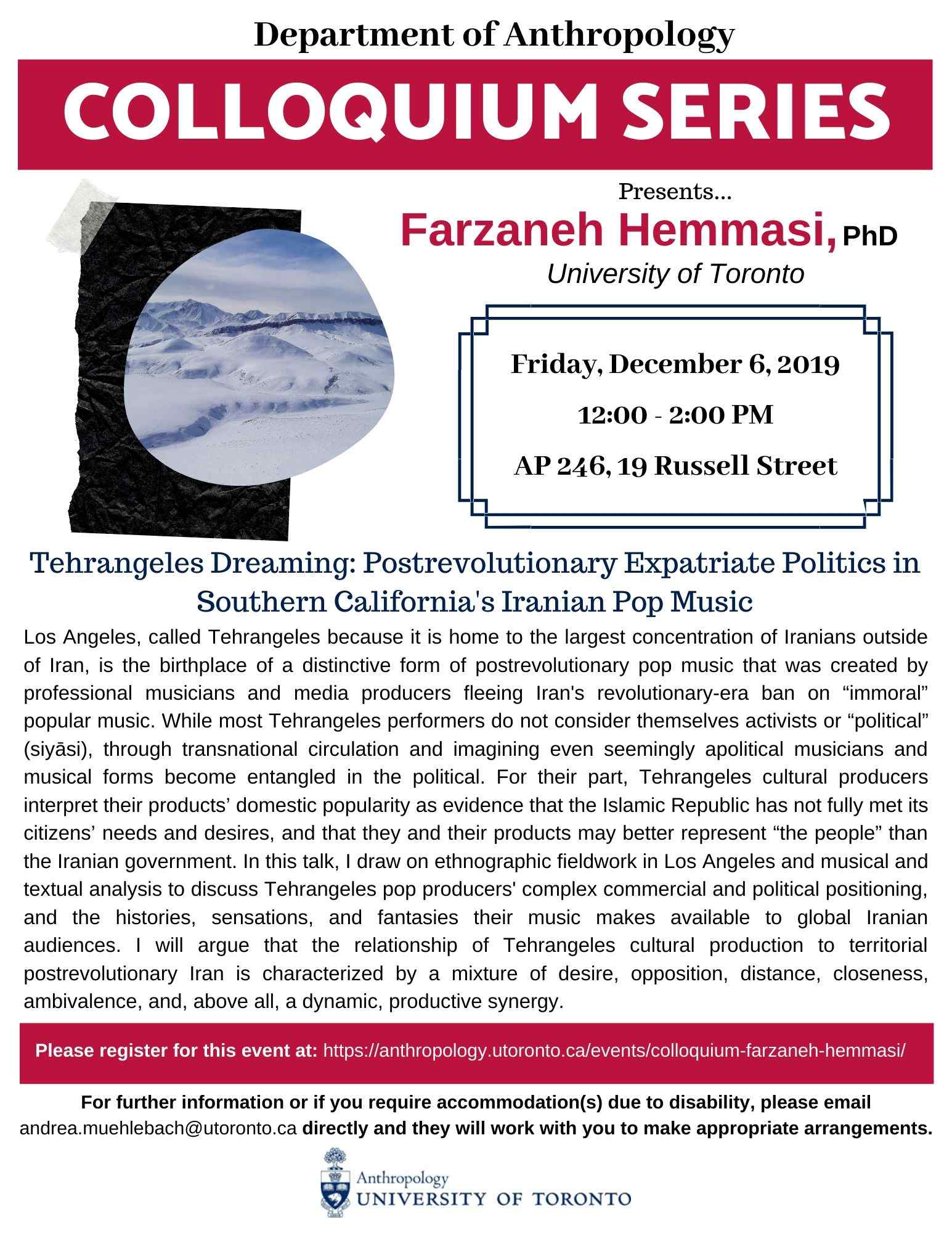Colloquium: Farzaneh Hemmasi
When and Where
Description
 *OPEN INVITATION TO ALL*
*OPEN INVITATION TO ALL*
TALK TITLE: Tehrangeles Dreaming: Postrevolutionary Expatriate Politics in Southern California’s Iranian Pop Music
TIME: 12-2 pm
DATE: December 6, 2019
LOCATION: AP 246, Anthropology Building, 19 Russell St.
Full Abstract:
Los Angeles, called Tehrangeles because it is home to the largest concentration of Iranians outside of Iran, is the birthplace of a distinctive form of postrevolutionary pop music. Created by professional musicians and media producers fleeing Iran’s revolutionary-era ban on “immoral” popular music, Tehrangeles pop has been a part of daily life for Iranians at home and abroad for decades. While most Tehrangeles performers do not consider themselves activists or “political” (siyāsi), through transnational circulation and imagining even seemingly apolitical musicians and musical forms become entangled in the political. In official Islamic Republic discourse, expatriate Tehrangeles cultural producers who left around the time of the revolution are sometimes called farāri (“escapees”) or agents in a “soft war” who “spread corruption” via expatriate media. For their part, Tehrangeles cultural producers interpret their products’ domestic popularity as evidence that the Islamic Republic has not fully met its citizens’ needs and desires, and that they and their products may better represent “the people” than the Iranian government. “Giving the [Iranian] people what they want” is at once a business strategy and an ideological orientation that impacts how and why Tehrangeles popular culture sounds, looks, and travels the way it does. In this talk, I draw on ethnographic fieldwork in Los Angeles and musical and textual analysis to discuss Tehrangeles pop producers’ complex commercial and political positioning, and the histories, sensations, and fantasies their music makes available to global Iranian audiences. I will argue that the relationship of Tehrangeles cultural production to territorial postrevolutionary Iran is characterized by a mixture of desire, opposition, distance, closeness, ambivalence, and, above all, a dynamic, productive synergy.
Short Biography:
Farzaneh Hemmasi (Ph.D., Columbia University ) is Associate Professor of Ethnomusicology at University of Toronto. Her monograph Tehrangeles Dreaming: Intimacy and Imagination in Southern California’s Iranian Pop Music (Duke University Press 2020) is an ethnographic exploration of the Los Angeles-based postrevolutionary Iranian expatriate culture industries. Her other publications consider the transnational circulation of political music and poetry between diaspora and homeland; a post-revolutionary political metaphorization of the Iranian female singing voice; and Iranian twentieth century “New Poetry” and popular music. These have appeared in the Journal of Middle East Women’s Studies (2017), Popular Communication (2017), Popular Music (2017), Ethnomusicology (2013), and Mahoor Music Quarterly (2008). She has also contributed to two edited volumes, Vamping the Stage: Female Voices of Asian Modernities (University of Hawaii Press, 2017) and Muslim Rap, Halal Soaps, and Revolutionary Theater: Artistic Developments in the Muslim World (University of Texas Press, 2011). An Insight Development Grant from the Social Science and Humanities Research Council funds her current collaborative ethnographic research project on music, sound, space, and cultural policy in the City of Toronto.


